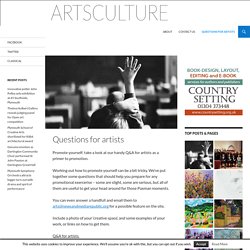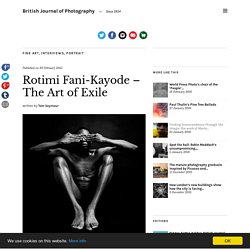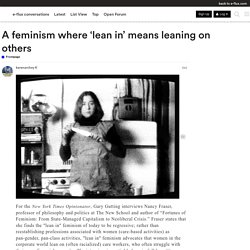

Gmail - Free Storage and Email from Google. Questions for artists - artsculture. Promote yourself: take a look at our handy Q&A for artists as a primer to promotion.

Working out how to promote yourself can be a bit tricky. We’ve put together some questions that should help you prepare for any promotional exercerise – some are slight, some are serious, but all of them are useful to get your head around for those Paxman moments. You can even answer a handfull and email them to arts@newsandmediarepublic.org for a possible feature on the site. Include a photo of your ‘creative space’, and some examples of your work, or links on how to get them. Q&A for artists.Who are you and what do you do? Why do you do what you do? How do you work? What’s your background?
What’s integral to the work of an artist? What role does the artist have in society? What has been a seminal experience? Explain what you do in 100 words How has your practice change over time What art do you most identify with? Rotimi Fani-Kayode – The Art of Exile – British Journal of Photography. Rotimi Fani-Kayode died 25 years ago, exiled for the crime of homosexuality.

As Nigeria adopts new anti-gay legislation, his legacy lives on In January 2014, Nigeria’s president, Goodluck Jonathan, signed a new law that allows his courts to punish same-sex “amorous relationships”, along with a raft of other anti-gay legislation that carries penalties of up to 14 years imprisonment. Gay organisations – from advocacy groups to nightclubs – are now banned, and “aiding and abetting” a gay man or woman can carry the same punishment.
Landlords, family, neighbours, fiends and employers of gay people are now seen as criminals in the eyes of Nigerian law. And in those areas to the north of the country that have adopted some form of Shari’a law, corporate punishments have included whippings, and could extend to execution. He may not be as outspoken as Simon Lokodo, ‘ethics and integrity’ minister of Uganda, who recently responded “why would I eat my own feaces?” Because Nigeria is not alone. MOUSSE CONTEMPORARY ART MAGAZINE. Your work employs different means of expression – photography, performance, film, publications – and each of these, in turn, entails different levels of exploration, but it all seems to spring from a literary approach and a fundamental passion for writing.

The stratification that can be felt in some of your pieces – I’m primarily thinking of the collages that travel through various spatial phases, from two-dimensionality to three-dimensionality, then return to their origins as “flat” images – seems to follow a narrative compositional scheme. Could you talk to me about this? One interesting aspect of your work is your use of a body, often your own. The performative element could be seen as a personal take on body art, where the body is an additional level through which to express your concept of the object. Where does your interest in the body come from, and what are your main references in connection to it? Jimmy Robert, Untitled (pleated girl), 2007courtesy: Diana Stigter, Amsterdam.
A feminism where 'lean in' means leaning on others. For the New York Times Opinionator, Gary Gutting interviews Nancy Fraser, professor of philosophy and politics at The New School and author of “Fortunes of Feminism: From State-Managed Capitalism to Neoliberal Crisis.”

Fraser states that she finds the "lean in" feminism of today to be regressive; rather than reestablishing professions associated with women (care-based activities) as pan-gender, pan-class activities, "lean in" feminism advocates that women in the corporate world lean on (often racialized) care workers, who often struggle with their own financial precarity. The interview in partial below; in full here84. Gary Gutting: You’ve recently written: “As a feminist, I’ve always assumed that by fighting to emancipate women I was building a better world — more egalitarian — just and free. But lately I’ve begun to worry that . . . our critique of sexism is now supplying the justification for new forms of inequality and exploitation.”